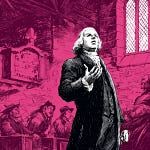Question 44: In what way did God the Father reveal himself in and through the life of God the Son?
Answer: By the Holy Spirit, Christ was conceived of the virgin Mary, lived a spotless life, was anointed and empowered in his messianic calling, was offered as a sacrifice for the forgiveness of sins, and was declared to be the Son of God in power by his resurrection from the dead. In every way, therefore, Christ revealed the Father, through his own life, in the power of the Holy Spirit.
Having grown up in the Pentecostal Church, my early impressions of the work of the Holy Spirit consisted in two essential things. In retrospect, it was an incredibly limited perspective, which is ironic given the emphasis of the pentecostal movement on the gifts of the Holy Spirit. The two points at which our lives directly intersected with the Holy Spirit, as it seemed to me, were regeneration and supernatural gifts. On the one hand, there was an unusual streak of calvinism in what I was taught, and so the mysterious work of regeneration was explained to be a work of the Holy Spirit. However, this regenerating work of the Holy Spirit was also mysterious, and not exactly something that connected with experience. It was more like something that you kind of knew in theory. The other point of intersection between the Holy Spirit and our experience in the Christian life, at least as I perceived it in those days, was in the immediate use of supernatural spiritual gifts – such things as speaking in tongues. Without any immediate experience of speaking in tongues for myself, this too was a doctrine removed from anything that felt like a lived reality to me.
What’s your experience been like with the Holy Spirit? Is there anything in your experience where you could categorically testify that the Holy Spirit has worked in you? It’s a question worth asking. It’s a question little understood, I think. This is not to say that we have no experience of the Holy Spirit’s work, but perhaps that – like a small child – while we can see, we have no understanding of or words to explain the workings of the eye. Where, then, do we find the intersection between the work of the Holy Spirit, and our own spiritual experiences?
In Part 2 of our studies in the doctrine of the truth of God, we saw the centrality of Christ as the sum and substance of divine revelation. Christ reflects and reveals God the Father to us, fully and perfectly.1 As we move forward in our consideration of the Spirit’s role in God’s truth and the revelation of that truth to us, we cannot separate the Spirit’s work in divine revelation from the person of Christ. Christ is and must be central in our understanding of how the Spirit works in our lives. Let’s consider, for now, a high level overview of what I’m trying to say here.
Because Christ is the full revelation of God the Father, the Spirit’s part in the work of divine revelation is ever and always designed to show us Christ, and magnify him to our vision. In John 16:12-15 Jesus spoke of this: “I still have many things to say to you, but you cannot bear them now. When the Spirit of truth comes, he will guide you into all the truth, for he will not speak on his own authority, but whatever he hears he will speak, and he will declare to you the things that are to come. He will glorify me, for he will take what is mine and declare it to you. All that the Father has is mine; therefore I said that he will take what is mine and declare it to you.” The Spirit glorifies and exalts Christ in his work of revelation. God the Father speaks, and his word is Christ. God the Holy Spirit reveals Christ perceptionally to us that we may know him personally. This is the pre-eminent aim, goal, and work of the Holy Spirit in our lives.
I think that, in general terms, our understanding of the Holy Spirit’s role in divine revelation is vastly shrouded in our own ignorance. This next series of articles will, hopefully, begin to remedy that situation, and we start here: Christ himself, as the incarnate revelation of the Father’s heart and character, was revealed in the power of the Holy Spirit. J.V.Fesko makes a very clear case that, at every point in Christ’s life, we see the power of the Holy Spirit at work. A survey of Christ’s life itself will bear this fact out clearly.
As to his incarnation, scripture testifies that Mary was found to be with child by the Holy Spirit (Mt 1:18). That miracle of life in the womb, in itself already a marvellous and mysterious work of God (Ps 139:13), went beyond the realms of human imagination or understanding as Christ was conceived. We confess it plainly in the Nicene Creed: “he became incarnate by the Holy Spirit and the virgin Mary, and was made human.” The Holy Spirit was unequivocally instrumental in the making of Christ’s human nature. Christ was thus fully conceived and incarnate by the Holy Spirit.
As the Lord grew, and lived a spotless and blameless life, this too was by the power of the Holy Spirit. Common with all mankind,2 his life generally was sustained by the Holy Spirit. Unlike us, however, he was not born dead in sin, but lived a perfect spotless life in the power of the Holy Spirit. “Christ’s entire earthly ministry was stamped by the presence of the Holy Spirit” (Fesko, Giver of Life, p.23). As the Westminster Confession of Faith rightly testifies, Christ, “by his perfect obedience, and sacrifice of himself, which He, through the eternal Spirit…” (WCF 8.5). This confession of Christ’s total empowerment by the Spirit in his incarnation is a matter of reformed orthodoxy.
More specifically, scripture also testifies that Christ’s messianic office was an anointing of the Holy Spirit. Isaiah prophesied that it would be so: “Behold my servant, whom I uphold, my chosen, in whom my soul delights; I have put my Spirit upon him; he will bring forth justice to the nations.” The Lord was anointed especially, then, to fulfill his messianic calling. As he was baptised, the Spirit descended on him like a dove (Mk 1:10), and then: “The Spirit immediately drove him out into the wilderness. And he was in the wilderness forty days, being tempted by Satan. And he was with the wild animals, and the angels were ministering to him” (Mk 1:12-13). “Christ’s carried out his ministry in the power and anointing of the Spirit, and this anointing was the means by which the Father equipped the Son for his work” (Fesko, Giver of Life, p.24). “And the Spirit of the Lord shall rest upon him, the Spirit of wisdom and understanding, the Spirit of counsel and might, the Spirit of knowledge and the fear of the Lord” (Is 11:2).
In addition to Spirit-empowered preaching and miracles (Lk 4:16-21), and Christ’s authority over demons by the Spirit of God (Mk 3:22-30; Mt 12:28), the Lord’s ministry culminated in his death and resurrection unto the salvation of sinners, for the glory of God. This too was a work conducted in the power of the Holy Spirit. Hebrews 9:13-14 makes this clear: “For if the blood of goats and bulls, and the sprinkling of defiled persons with the ashes of a heifer, sanctify for the purification of the flesh, how much more will the blood of Christ, who through the eternal Spirit offered himself without blemish to God, purify our conscience from dead works to serve the living God.” How did Christ offer himself? Through the eternal Spirit.
His final deeds done on earth, his resurrection and ascension, were not exempt from the Spirit’s ever-dwelling and empowering presence in Jesus’ life. He “was declared to be the Son of God in power according to the Spirit of holiness by his resurrection from the dead” (Rom 1:4, see also Rom 8:11; 1 Pt 3:18).
Have you ever pondered this before? As we read the gospels, in one sense, they are as much about the Holy Spirit as they are about Christ, for Christ lived at every point in the power of the Holy Spirit. He revealed the Father, and was enabled to fulfill that calling by the Spirit. The Holy Spirit, at every point, was at work in and through the incarnate life of our Lord Jesus Christ. These facts of the Holy Spirit’s activity in Christ’s incarnation are a kind of bedrock, or foundation, upon which we can begin to understand how exactly it is that the Holy Spirit ministers to us in our own lives.
As one essential point of application here, without yet delving into the details of how the Spirit works in our lives, we might pose this simple question to consider: Is Christ central in our lives? The wind blows where it will, and so it is with the Spirit’s work. But a love for Christ, a following hard after him, these things in a person’s life are encouraging signs that the Spirit is at work. Is that the case for you? Is that the case for me? Do your thoughts turn often to Christ? Are your affections warmed unto him? Are you compelled to act by his love? Or have we grown cold? Pray that the Holy Spirit may move upon the waters of our hearts. Pray that he may indeed exalt Christ before our eyes. Our Heavenly Father will by all means give the Holy Spirit to those who ask. And that brings home a second point of application.
In Christ’s life, at every point, he was empowered by the Holy Spirit. In our lives too, in a general sense we receive life from the Holy Spirit. But as believers too, our sanctification and good deeds is at no point a matter of self-sufficiency. We must live utterly in reliance on the Holy Spirit. So it was for our Saviour, and we are by no means superior to him! How could we possibly imagine that we would be sufficient in ourselves? At all times, then, and in every way – cry out to the Lord for the empowering help of his Holy Spirit. SDG.
1 Question 8: In what way does Christ reflect and reveal God the Father to us?
Answer: Christ, being the Word and Son of God, fully and perfectly reflects and conforms to his character, fully reveals and expresses his mind, and is himself fully God and the one in whom the fullness of God wholly dwells.













Share this post